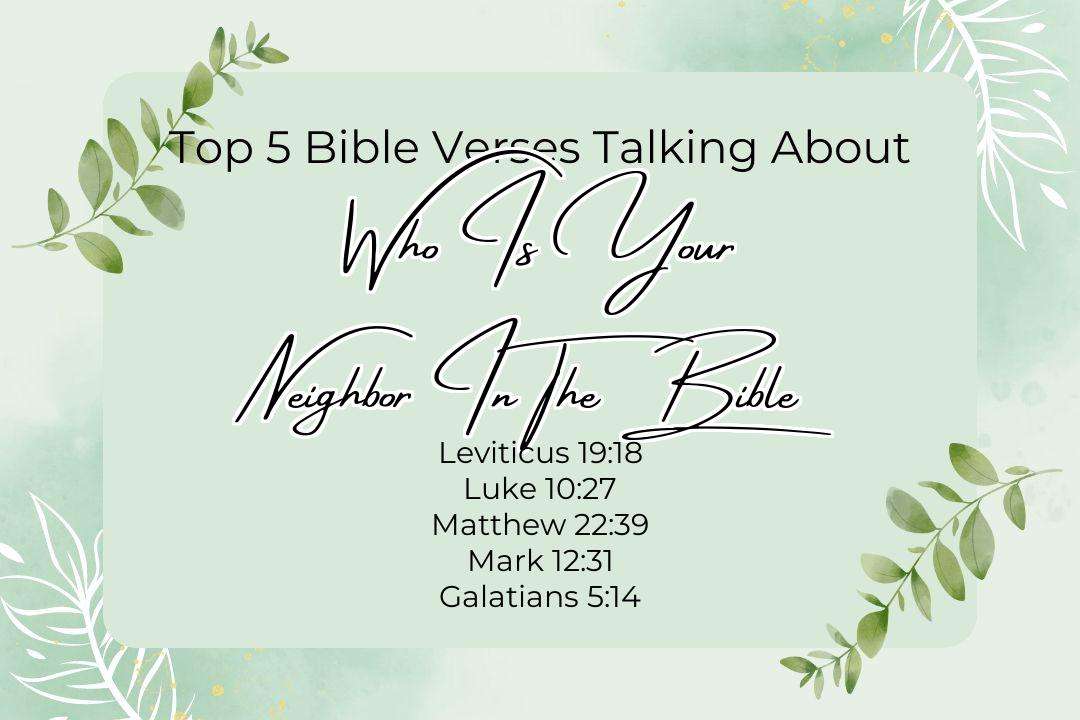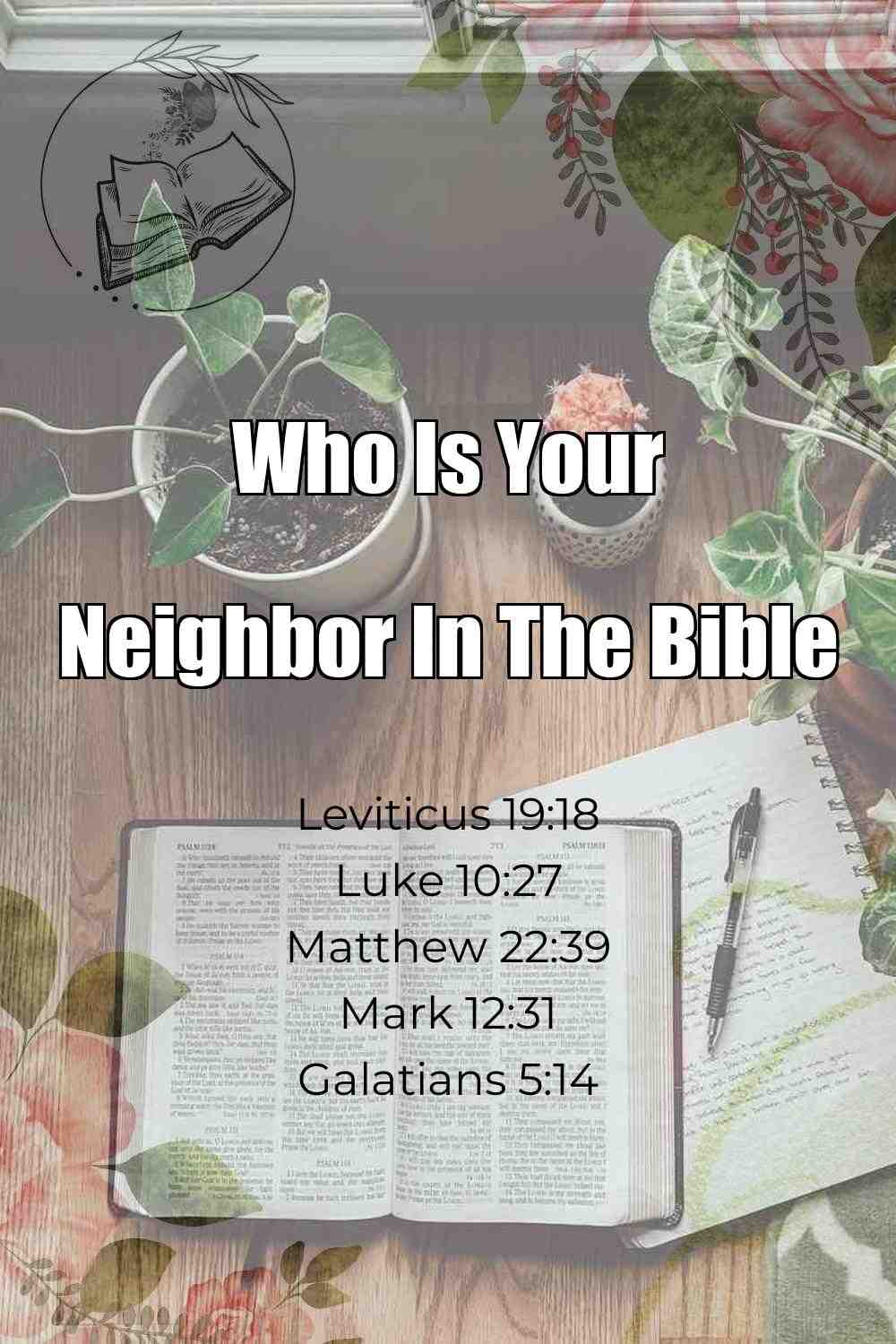So, I’ve always wondered – when Jesus was all, “love your neighbor like you do yourself”, who was he really talking about? My mind starts racing – is it the guy next door who always leaves his trash cans out, my cubicle buddy at work, or maybe some random person I bump into on my morning commute? I’ve been digging into the Bible, and what it says about neighbors is kinda blowing my mind – like, it could totally change how I live my faith day in and day out.
Top 5 Bible Verses About Who Is Your Neighbor In The Bible
To be honest, digging deeper into these specific Bible verses completely flipped my understanding. I mean, there’s this one part where it’s pretty vague, but then I found these other passages that add way more context. They’ve got some pretty valuable info, in my opinion. Here’s what I found, and I think you’ll find it pretty interesting too – take a look at these:

Picture by BibleBreathe.com about Who Is Your Neighbor In The Bible
Trying to Figure Out What the Bible Means by “Neighbor”
When I think about what the Bible says about neighbors, it gets me wondering – who does it mean, exactly? Like, is it just the guy next door?
What Did “Neighbor” Mean in the Old Days?
In the ancient times when the Bible was written, a neighbor wasn’t just, you know, the person living next to you. The Hebrew word “re’a” had a broader meaning, taking in friends, family, and even strangers you’d bump into.
“Thou shalt love thy neighbour as thyself” (Leviticus 19:18, KJV).
This rule doesn’t just say love your neighbor if they’re nice or living next door. No, it says be kind to anyone you meet.
How Important Were Neighbors in Ancient Jewish Times?
Neighbors back then were super important to the community. They’d celebrate together, help each other out, and just generally be there for one another.
I was reminded of the importance of being there for others when I came across a Bible verse that said
“Bear ye one another’s burdens, and so fulfil the law of Christ” (Galatians 6:2, KJV).
That made me think being a good neighbor isn’t just about smiling and waving, it’s about offering to lend a hand.
What Does the Bible Say About Loving Your Neighbor?
The Bible tells us loving our neighbor isn’t just a nice idea – it’s fundamental to living a life that honors God. That means putting others first, being kind and understanding, and treating them the way I’d like to be treated.
Martin Luther King Jr. was right when he said,
“Love is the only force capable of transforming an enemy into a friend.”
I’ll be the first to admit it’s not always easy to love my neighbor, but I’m working on it. With some help from above, I’m trying to see my neighbors the way God sees them – with love and kindness.
How the Good Samaritan Story Changed Me
It’s Funny How Some Stories Just Stick
That time I came across the parable of the Good Samaritan in Luke 10:25-37 has been etched in my memory. For some reason it’s had this lasting impact and makes me wonder – what’s the real meaning of being a good neighbor, you know?
According to the Bible,
“And, behold, a certain lawyer stood up, and tempted him, saying, Master, what shall I do to inherit eternal life?” (Luke 10:25, KJV).
Now, that lawyer – they weren’t exactly coming from a good place; it was more like they were trying to trip Jesus up. But then Jesus turned the tables and posed the question back at the lawyer, asking what the law said about inheriting eternal life. They quoted it back, but little did they know, they were in for a story that’d totally shift their perspective.
Who We Consider a Neighbor
So there’s this story. Guy’s headed from Jerusalem to Jericho, and out of nowhere, these robbers jump him, leaving him for dead. You’d think a priest or a Levite would help, but nope, they just passed him by. Not until a Samaritan shows up does the guy finally get some aid.
It says in the Bible,
“But a certain Samaritan, as he journeyed, came where he was: and when he saw him, he had compassion on him” (Luke 10:33, KJV).
The thing about this Samaritan – he didn’t just lend a hand, he went the whole nine yards. Cleaned the guy’s wounds, even dropped him off at an inn and covered the tab.
Lessons from a Good Neighbor
What’s the moral of the story? For me it’s that being a good neighbor comes down to this – empathy. It’s not about convenience or when you feel like it, but just when someone needs it. A good neighbor looks at someone else and thinks, “that’s another person, just like me” – and they act with kindness, compassion.
Maya Angelou said it best, “Do the best you can until you know better. Then when you know better, do better.” This parable – it’s like a little voice telling me to do better, be better, and spread kindness wherever.
People in the Bible Who Are, Like, Really Good Neighbors

Photo modified by BibleBreathe.com. Original photo by Kiwihug on Unsplash
I was thinkin’ about this whole “who’s your neighbor” thing from the Bible and it hit me – there’s heaps of rad examples throughout.
Ruth and Naomi, Total BFFs
One of my fave stories has gotta be about Ruth and Naomi, they’re like, so tight.
This chick Ruth, she’s from Moab and marries an Israelite dude but when he dies she’s stuck with her mother-in-law Naomi, just the two of ’em.
So anyway, Ruth is like, I’m not gonna leave you Naomi, I love you, even if means leaving behind my whole world. Nuts.
It’s like, read what she said,
“And Ruth said, Intreat me not to leave thee, or to return from following after thee: for whither thou goest, I will go; and where thou lodgest, I will lodge: thy people shall be my people, and thy God my God:” (Ruth 1:16, KJV).
I reckon it’s awesome how ruthless (get it?) she was, makes me wanna try be a better friend…er, neighbor… during tough times.
Jonathan and David, a Love-Hate-Love Thing
And what about these other two blokes, Jonathan and David? Talk about complete opposite sides of the track and should’ve been arch-nemesis, but then… this beautiful thing.
No joke, they showed the whole love respects loyalty shtick, it was the real deal… still kinda goes to show even the highest mountain of disagreement might get trumped when connections forge outta nothing.
Some old C.S. dude summarised the whole things, did I just say that – anyway, love this one bit which goes along the line: “Friendship is unnecessary, like philosophy, like art… It has no survival value; rather it is one of those things that give value to survival”.
Those Other Bible People Too
Few ripper examples would be that famous Good Samaritan in need fella (Luke 10:25-37), a crazy but cool fam among the first proper-ish church of people shared more than just words (Acts 2:42-47)… even Jesus caught talking up the rejected crew (the vertical-seeking-richer-tard one AND that woman, ar well with bucket of more), as legends too. Every person I came ac crossed from our dusty testament books – neighbours, the real uns.
.. so we sould ask.. not so ask; who’s your literal or figurite neighboor these new b world urs?
Figuring Out How to Love My Neighbor
A Look at Matthew 22:37-40
Lately I’ve been wondering, what does it actually mean to love the people around me? And that’s when Matthew 22:37-40 pops into my head.
“Jesus said unto him, Thou shalt love the Lord thy God with all thy heart, and with all thy soul, and with all thy mind. This is the first and great commandment. And the second is like unto it, Thou shalt love thy neighbour as thyself. On these two commandments hang all the law and the prophets” (Matthew 22:37-40, KJV).
Thing is, this whole loving my neighbor business is a real challenge – like, who am I even supposed to be loving?
How Loving God and Loving My Neighbor are Connected
It’s all starting to click for me – loving God isn’t separate from loving the people around me, they’re connected at the hip, or something.
“If a man say, I love God, and hateth his brother, he is a liar: for he that loveth not his brother whom he hath seen, how can he love God whom he hath not seen?” (1 John 4:20, KJV).
I mean, saying I love God but not showing love to the people I actually see every day? Yeah, that’s basically meaningless.
Showing Love to My Neighbor in Real Life
Okay, so how do I actually go about loving my neighbor? I guess it means I gotta be intentional about getting to know people – whether that’s a coworker, the person living next door, or just some random person I run into at the grocery store. And sometimes that means doing stuff that’s hard or annoying – but that’s kinda the point. It’s about being willing to listen, or to help out, without expecting a pat on the back or whatever.
Like Mother Teresa said, “Spread love wherever you go. Let no one ever come to you without leaving happier. Be the living expression of God’s kindness: kindness in your face, kindness in your eyes, kindness in your smile.” I mean, who wouldn’t wanna be like that – someone who actually shows the world what it means to love our neighbor?
Trying to Be a Good Neighbor
Figuring Out Empathy and Stuff
I was just thinking, you know, about that whole “love thy neighbor” thing in the Bible, and it made me remember that parable about the Good Samaritan. So, Jesus tells this story and it’s kinda illustrating how we should love our neighbors like, you know, ourselves and all. But then I’m like, what does it actually mean to be a good neighbor, right? I mean, I guess one major thing is being compassionate and empathetic.
As I stroll through my neighborhood, I’m surrounded by people with all kinds of lives – some folks scraping to get by, others just cruising along, enjoying their hard-earned perks… and I realize, they’re all the same, actually – just, you know, human beings that deserve some basic love and respect, no matter what.
The Bible goes,
“Rejoice with them that do rejoice, and weep with them that weep.” (Romans 12:15, KJV).
Reading this always makes me think that being a decent neighbor’s about sharing both the ups and downs of those around me.
Can I Pull Off Kindness and Generosity?
So then there’s kindness and generosity, right? Sometimes it’s super easy, like just bein’ friendly, flashing a smile and sayin’ hi, but other times it’s a little more than that, like puttin’ in some actual effort to help someone.
I’m pretty sure I drove my neighbor to work one time, their car busted or somethin’, and honestly, it wasn’t a huge deal or anything, but they seemed pretty relieved. That whole thing in the Bible that says,
“It is more blessed to give than to receive.” (Acts 20:35, KJV),
I’m not saying that’s me, but maybe.
It’s Best to Just Not Think About Myself So Much
Lastly, good neighbors tend to be, you know, pretty humble and all about putting others first – selfless, you know? We can’t just go around doin’ our own thing, hoping others won’t bother us, that doesn’t cut it.
Gandhi had this solid thing to say about servin’ others: “The best way to find yourself is to lose yourself in the service of others.” Whenever I choose to look outward and serve others, that’s usually when I feel some actual purpose and satisfaction, right?
Who’s my neighbor in the Bible? Everyone, I guess – that annoying co-worker, the person strugglin’ financially down the street, and also that random person passin’ by – yep, all them. From what I gather, just takin’ the time to care about their struggles and showin’ some compassion can make me a pretty okay neighbor.
Figuring Out What This “Neighbor” Thing Means Today
My Quest to Figure Out Who My Neighbors Are and How to Show ‘Em Some Love
Walking down my street, I get to thinkin’ about how necessary it is to care for the people I run into daily. So, like, who exactly are these neighbors I’m supposed to be loving, huh? This old question from a lawyer dude in a Bible story, it’s pretty relevant:
“And who is my neighbour?” (Luke 10:29, KJV).
That lawyer, he was basically trying to get out of doing the right thing, but it raises some interesting questions.
For me personally, recognize my neighbors means getting past those immediately next door. My neighbor could be that person serving coffee at my usual spot, or it could be somebody two cubicles over, you know, that nice woman down in that big apartment complex.
Bringing Myself (and Others) Closer to the People I Interact With
One of these days, building those connections to people around me requires effort— both getting to know who folks are and staying attentively in their lives (not always smoothly, might I add). That genius writer lady Maya Angelou dropped some relevant truth here,
“I’ve learned that people will forget what you said, people will forget what you did, but people will never forget how you made them feel.”
It kinda goes without sayin’ that just taking the genuine time for those nearby makes profound real connections.
What Showing Up for Others in Need Looks Like for Me
Okay so what really does showin’ we care look like in real people terms? In practical ways, to care and step up means I might need to step out a tad and show life interest, on point. If my literal neighbor needs her kids watched last minute while she deals – then I lend the hands if at all available. It’s being there when called to be for all men and the truest guide left here has led me to witness more. Specifically scripture,
“Bear ye one another’s burdens, and so fulfil the law of Christ” (Galatians 6:2, KJV).
When active engagement shows Christian serving love and bears out serving those in surrounding location – my closest— hope and healing begin their true reveal.
What Do You Think?
What’s your take on this verse? Share your personal insights or prayers below. We’d love to hear how it speaks to you!
Spread the word by sharing this post and check out more fascinating topics at BibleBreathe.com!

Photo modified by BibleBreathe.com. Original photo on Unsplash.
Frequently Asked Questions About Who Is Your Neighbor In The Bible
What does the Bible mean by loving your neighbor as yourself?
Honestly, I think loving my neighbor as myself is, like, treating them how I wanna be treated – you know, with kindness and all that jazz. It’s basically about tryin’ to see things from their perspective, feelin’ for ’em, and puttin’ their needs first, which is pretty much what Jesus said in Mark 12:31.
Who is considered a neighbor according to the Bible?
In my opinion, the Bible’s idea of a neighbor is pretty wide-ranging, to be honest. It’s not just that one person who lives next door; it’s anyone I come into contact with, particularly those who could use a hand. What Jesus is sayin’ is, our neighbors are anyone we can show some love to – just like in that story about the Good Samaritan.
What does the parable of the Good Samaritan teach about being a neighbor?
For my money, the Good Samaritan story is all about treatin’ people with compassion and kindness, no matter what their deal is. It’s sayin’ that bein’ a good neighbor isn’t about where you live so much as bein’ willin’ to lend a helpin’ hand and care about people, like the Samaritan fella did.
Matt Turner
I’m Matt, and I love breaking down Bible verses in a way that’s easy to understand and apply to everyday life. My goal is to help you connect with God’s Word and find practical ways to live it out. Whether you’re new to the Bible or just looking for some fresh insights, I’m here to walk with you and share what I’ve learned along the way.

